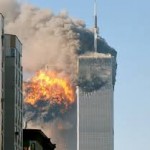I remember, in the days that followed the 9/11 attack, hearing the endless trope from news reporters, who declared that “nothing would be the same again.” And I confess that my reaction to that repeated phrase was pretty much one of
 annoyance. Terrible things happen over and over I thought, and people just get on with their lives as best they can. Nothing is ever the same as it was. Life changes. Sure, for the people who died, for the people who lost loved ones, everything is different, but the rest of us just go on. Why declare that everything is different now, but not for every other tragedy that strikes somewhere in the world?
annoyance. Terrible things happen over and over I thought, and people just get on with their lives as best they can. Nothing is ever the same as it was. Life changes. Sure, for the people who died, for the people who lost loved ones, everything is different, but the rest of us just go on. Why declare that everything is different now, but not for every other tragedy that strikes somewhere in the world?
I was, of course, wrong. Everything did change, if only in subtle ways. Not because we as Americans suffered a unique loss, beyond what folks in other parts of the world had known. But rather because for once we suffered the same kind of loss as countries who had been ravaged by all the various kinds of religious and nationalistic violence that have devastated communities across the centuries. All the years before we had read about Bosnia or Palestine or Libya and thought: those poor people, and gone on with our lives without anything much changing. Violence on that scale was a tragedy, but not our tragedy, not something that would that would touch our own lives.
That’s how we get through the immense hardships of the world. We all know people who have lost their dearest ones to murder, to heart attack, to the slow ravages of cancer or the sudden onslaught of an accident. And our heart aches for those people, but it doesn’t break, because we hold to the illusion that those things won’t happen to us, or to the ones we can’t imagine living without. We can’t afford for everything to be different any time that tragedy strikes around us, or we wouldn’t be able to function. And so our prayer for comfort for the bereaved is always secretly a prayer of thanks that this time we were spared.
But eventually that terrible lightning strikes close enough to home that we are singed. And it turns out that we are not immune, not protected by God or our virtue or our customary privilege. When the World Trade Center towers came down, many of us felt our own personal defenses crumble with them. And everything changed, because we had to come face to face with the reality that loss on such a grand scale really could camp out on our very doorstep.
And then we had to figure out how to respond. Would we build back our personal defenses through going on attack, following the illusion that we could simply exterminate everyone who was a possible threat? Would we declare that some set of people was “bad,” so that we could recreate the illusion of safety by locking those people literally or metaphorically away? Would we will build more walls, choose safety over freedom, aggression over attentive listening? Why yes, we would.
Because anything is better than simply dwelling in the knowledge that we are not safe, that the horrors which befall any one of us could befall all of us, that loss lurks around every corner. Of course we want to hold on to any measure of security we can find.
But after all these years, I hope that we can search for that security with a greater measure of rationality, and perhaps even a greater measure of compassion, than we were able to muster in the wake of the burning towers. I hope that we can remember some of the things that we have learned in painful experience of the intervening years: That striking back at the wrong target doesn’t help. That the enemy of the bad guys isn’t necessarily a good guy. That it is far easier to respond than to control the effect of your response. That complex problems don’t often have simple solutions.
And that, ultimately, our greatest security lies not in any of our attempts to make sure that tragedy never strikes, but rather in our ability to hold and help and care for one another when the hard times come.












